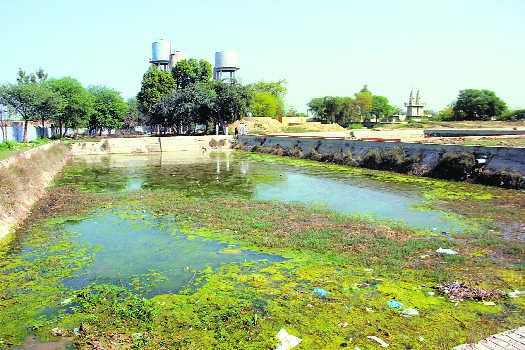
The water works at Kikar Khera village in Fazilka. Tribune photo: Pawan Sharma
Jasmine Singh in Fazilka
Chander Prakash from village Ghallu (Fazilka) has no hope of getting potable water in the village. “You can put our village on sale, but give us clean drinking water. Look at our RO (reverse osmosis) and water work systems,” says Chander. Villagers say the community RO system of the village has been dysfunctional for about three years. The people have found a better use of it: they dry cow dung over it! The only available source is the water works system, which is also in a bad state: its filters are dry, and the stored water has huge deposits of algae and waste. Water from open storages is fed directly to the overhead tank without filtration. And it is from this tank the water is supplied to the entire village through pipes. Plus, the village panchayat has a pending bill of Rs 14 lakh.
Sarpanch Sohan Lal says the tender process for the filters is underway, and that the process will be completed soon. The water works of the village had cost Rs 2 crore 29 lakh. “Apko kahin lagta hai itna paisa laga yahan?,” asks a villager. In 2015 during a regular checking of drinking water, the sample from this village was sent to the state Public Health Laboratory, Chandigarh, which reported that the water was unfit for drinking.
Ditto is the situation in the nearby Alamgarh and Kiker Khera, where villagers are forced to drink toxins-laced canal water. No wonder the villages have reported several cases of liver and kidney failure, and premature greying of hair in young children. “Paani ganda hai, tanhi waal white ho gaye,” says Surinder, “mere brother de vi waal white hain.”
The department of water supply and sanitation says its mobile testing labs conduct “effective surveillance” of drinking water supply in rural areas. But the villagers say such surveillance is very infrequent and no remedial measures have been taken to improve the water quality.
State government officials say since the state needs significant improvements in the quality of drinking water in rural areas, the government has taken up a World Bank-supported Rural Water Supply & Sanitation plan. This will cover villages for over five years and involve a cost of Rs 1,280.30 crore. The plan also includes rejuvenation of reservoirs and minor repair and replacement of the existing facilities.
As per the World Bank scheme, some villages have formed societies for running water work systems. In a temporary arrangement such as the ROs, a contractor is hired for seven years for maintenance. Later the RO system is given to a panchayat, which may hand the managing system back to the water works department.
Officer on special duty to the rural development & panchayat minister in the state, Gurdarshan Singh Bahia, looks at the scenario in both the arrangements. “In villages, like Singpura in Ropar, where the water works responsibility is with the village, the arrangement is working fine. In other villages, the department takes care of the drinking water needs,” he says.
Tript Rajinder Singh Bajwa, cabinet minister, rural development and panchayats, agrees that ROs in over two dozen villages are not working. “Tenders have been approved, and in a month's time everything will be in order.”
Rajinder Singh, chief engineer, Water Supply and Sanitation, Central Wing, says the department has a scheme — valid till March 20 — that will help panchayats clear their pending dues in a one-time settlement. “A bill of Rs 10,000 can be waived by paying only Rs 2,000,” he says.
But waiver is one thing and getting contaminated water is another. Kahan Singh Pannu, chairman, Punjab Pollution Control Board, is quoted as saying that studies done by various universities and labs reveal that 75 per cent of the groundwater in most districts can be made potable. “About 50 per cent of groundwater in Bathinda, Muktsar, Fazilka, Ferzoepur, Fardikot has a good quality water rating,” he said.
His statement follows the state government recently banning 20 pesticides as these were found to have contaminated the groundwater.



























